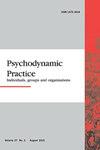It’s not in the bottle: research, ethics & psychotherapy
IF 0.4
Q4 PSYCHOLOGY, CLINICAL
引用次数: 0
Abstract
Today, professions and disciplines of all kinds fall over themselves to present their claims as being ‘evidence-based’ in order to garner for themselves the kudos of being a positivist science. In this paperI will critique attempts made by the ‘psy’ disciplines’ (psychiatry, psychology and psychotherapy) to use positivism to enter the citadel of science. Amongst other things, I will argue that their efforts have resulted in the corruption and distortion of the principles of (positivist) science. I will argue that positivist methodologies are unable, even in principle, to capture the intricacies of human exchange; in lieu of positivism, notions of emergence and complex responsive processes are more appropriate. Additionally, the argument will also raise questions about the idea of science itself, and claim that much of what passes for science in this territory is a distortion of reality rather than a description of it.它不在瓶子里:研究,伦理和心理治疗
今天,各种各样的专业和学科都争先恐后地把自己的主张说成是“循证的”,以便为自己赢得实证科学的荣誉。在本文中,我将批评“精神病学”学科(精神病学、心理学和心理治疗)试图利用实证主义进入科学堡垒的尝试。除此之外,我认为他们的努力导致了(实证主义)科学原则的腐败和扭曲。我将论证实证主义方法论即使在原则上也无法捕捉到人类交换的复杂性;代替实证主义,涌现和复杂反应过程的概念更合适。此外,这一论点还会对科学本身的概念提出质疑,并声称在这一领域,许多被认为是科学的东西都是对现实的扭曲,而不是对现实的描述。
本文章由计算机程序翻译,如有差异,请以英文原文为准。
求助全文
约1分钟内获得全文
求助全文
来源期刊

Psychodynamic Practice
PSYCHOLOGY, PSYCHOANALYSIS-
CiteScore
0.90
自引率
0.00%
发文量
41
期刊介绍:
Psychodynamic Practice is a journal of counselling, psychotherapy and consultancy and it is written for professionals in all fields who use psychodynamic thinking in their work. The journal explores the relevance of psychodynamic ideas to different occupational settings. It emphasizes setting and application as well as theory and technique and focuses on four broad areas: •Clinical practice •The understanding of group and organisational processes •The use of psychodynamic ideas and methods in different occupational settings (for example, education and training, health care, social work, pastoral care, management and consultancy) •The understanding of social, political and cultural issues
 求助内容:
求助内容: 应助结果提醒方式:
应助结果提醒方式:


